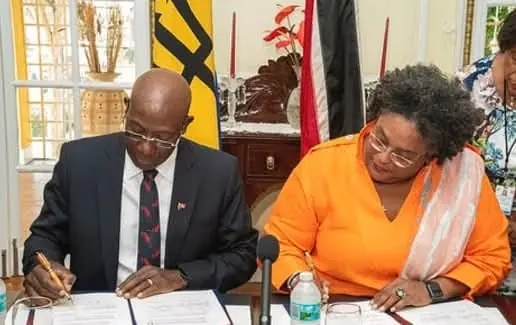PAHO pushes Caribbean Health Sector to invest in women
PAHO has shown its commitment to uplifting women in the Caribbean, demanded support to nurture women in leadership roles and bolstering the healthcare workforce in the Caribbean and the Americas.
11th of March 2024

The Pan American Health Organization (PAHO) has shown its commitment to uplifting women in the Caribbean, which is evident from its Director, Dr Jarbas Barbosa’s demand that greater support needs to be extended to nurture women in leadership roles and bolstering the healthcare workforce in the Caribbean and the Americas.
The organisation recognizes the impact of the COVID-19 pandemic, which highlighted many of the cracks within the healthcare systems of multiple nations in the region.
At an event organized by the Inter-American Task Force on Women’s Leadership, in conjunction with the Government of Canada and the Inter-American Commission of Women of the Organization of American States (CIM/OAS), Barbosa stated the following, “We cannot achieve universal health or reach the Sustainable Development Goals (SDGs) without equity in health and gender equality in the health sector.”
“Women’s Leadership in the Regional Health and Resilience Agenda” was chosen as the topic of the dialogue, being a matter of great significance to many in the region.
In the past, Barbosa has used his position as the Director of PAHO to bring to light the obstacles and difficulties faced by women in the health care sector. He has also highlighted the effect this has on their communities, their socio-economic status.
Thus, according to Barbosa, it is of the utmost importance that women are allowed play their role in decision making processes and the formulation of policies, seeing as they have a major effect on their lives.
Barbosa added, “We must build more equitable, gender-equal, resilient and sustainable societies, investing in women and their leadership.”
PAHO has also highlighted the fact that there is a noticeable gap in the representation of men and women in leadership roles with regards to health and social work globally. This has been seconded by the World Health Organization’s (WHO) analysis on gender and equality, which has revealed that stereotypes, privilege, pre-existing power structures and discrimination play a significant role in promoting this disparity.
This is exacerbated when race and class systems are taken into account, with women falling behind in this regard as well. In the healthcare sector specifically, a 26% pay gap is noticed, with women receiving lower salaries and occupying lower positions as well.
PAHO has reiterated that its policies, programs and technical cooperation work are formulated with the guiding values of gender equality and equity as the primary principles.
With this in mind the Director stated the following, “At PAHO, we are committed to investing in women and we firmly believe that incorporating women’s and girls’ voices and perspectives in decision-making is essential for building resilient health systems and will positively impact health and development.”
Luis Almagro, the OAS Secretary-General, spoke of the organisation’s commitment to gender equality throughout its long and illustrious history, which influenced the formulation of the Inter-American Democratic Charter.
The OAS has also worked extensively through the Inter-American Commission on Women for over 100 years so as to promote gender quality at many levels of society.
By engaging in these pursuits, the OAS has made a concerted effort to address multiple matters, including but not limited to parity in electoral processes and greater representation of women in positions of power.
Even though there has been substantial progress in these fields, Luis Almagro recognizes that gender inequality persists and is an important issue which needs to be addressed.
Thus, he and his organisation have recommended that a transformative approach be pursued, which would affect changes in societal norms and structures that continue to propagate discrimination based on gender.
The Assistant Director of PAHO, Dr. Rhonda Sealey-Thomas, spoke on the matter during a panel session of the Women’s Participation and Leadership in the Regional Health Agenda: Opportunities and Challenges.
During the session, she said that PAHO continues to seek ways in which women can be introduced to leadership roles in various fields and reach their full potential as productive members of society.
Latest
- National School Meals Programme rejects claims of substandard vegetarian meal in Antigua and Barbuda
-
LIAT Air Expands Caribbean Network with New Routes to Antigua and Montego Bay -
US withdraws advisory on St. Kitts and Nevis, gives green flag to its Citizenship Programme -
CARIFTA Games 2026 set to take place in Grenada from April 4-6 -
West Indies Women’s Cricket team announced for T20 series against Sri Lanka in Grenada
Related Articles


1st of December 2024

30th of November 2024

22nd of November 2024

26th of November 2024

25th of November 2024

25th of November 2024

18th of November 2024
